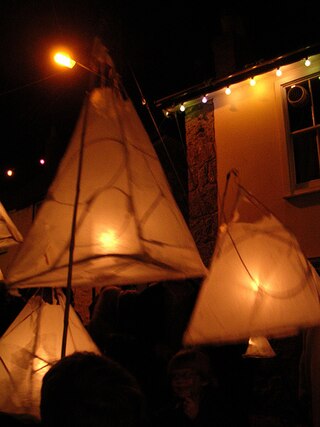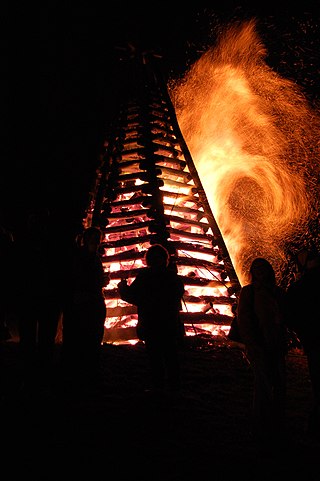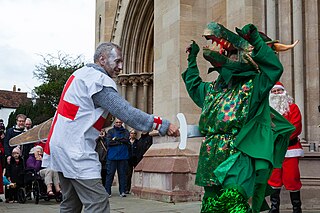Related Research Articles

Mulled wine, also known as spiced wine, is an alcoholic drink usually made with red wine, along with various mulling spices and sometimes raisins, served hot or warm. It is a traditional drink during winter, especially around Christmas. It is usually served at Christmas markets in Europe, primarily in Germany, Austria, Switzerland, Croatia, Romania, Nordics, Baltics and eastern France. There are non-alcoholic versions of it. Vodka-spiked mulled wine can be found in Polish Christmas markets, where mulled wine is commonly used as a mixer.

Saint Stephen's Day, also called the Feast of Saint Stephen, is a Christian saint's day to commemorate Saint Stephen, the first Christian martyr or protomartyr, celebrated on 26 December in Western Christianity and 27 December in Eastern Christianity. The Eastern Orthodox churches that adhere to the Julian calendar mark Saint Stephen's Day on 27 December according to that calendar, which places it on 9 January of the Gregorian calendar used in secular contexts. In Latin Christian denominations, Saint Stephen's Day marks the second day of Christmastide.

Midsummer is a celebration of the season of summer usually held at a date around the summer solstice. A variety of traditions have developed, linked to regions as well as religious practice.

Saint John's Eve, starting at sunset on 23 June, is the eve of the feast day of Saint John the Baptist. This is one of the very few feast days marking a saint's birth, rather than their death. The Gospel of Luke states that John was born six months before Jesus; therefore, the feast of John the Baptist was fixed on 24 June, six months before Christmas. In the Roman calendar, 24 June was the date of the summer solstice, and Saint John's Eve is closely associated with Midsummer festivities in Europe. Traditions are similar to those of May Day and include bonfires, feasting, processions, church services, and gathering wild plants.

The observance of Christmas around the world varies by country. The day of Christmas, and in some cases the day before and the day after, are recognized by many national governments and cultures worldwide, including in areas where Christianity is a minority religion. In some non-Christian areas, periods of former colonial rule introduced the celebration ; in others, Christian minorities or foreign cultural influences have led populations to observe the holiday.

Jul or jol is the term used for the Christmas holiday season in Scandinavia and parts of Scotland. Originally, jul was the name of a month in the old Germanic calendar. The concept of jul as a period of time rather than a specific event prevailed in Scandinavia; in modern times, jul is a period of time stretching from the fourth Sunday before Christmas Eve, December 24, to (traditionally) mid-January at the date of Epiphany with the month of December and Christmas, and the week up to the New Year, as its highlight. The modern English yule and yuletide are cognates with this term.
D'Arcy Broderick is a Newfoundland musician who plays fiddle, guitar, mandola, banjo, accordion and mandolin. He is best known as a former member of the popular Irish-Newfoundland bands The Irish Descendants and The Fables. He is currently performing around Newfoundland with the band Middle Tickle. Alongside of him in the band are: William Broderick (Drums), Glenn Hiscock, Paul Hiscock and the only remaining original band member Ron Kelly. Glen Hiscock and William Broderick are occasionally absent from the weekly show Middle Tickle plays at Shamrock City Pub. Broderick was one of the owners of Shamrock City Pub, located in Downtown St. John's, Newfoundland. He left Shamrock City in 2017 and opened a new and traditional Irish pub named Broderick's Pub, situated at 201 Water Street in St. John's, in January 2020.

The ugly stick is a Newfoundland musical instrument fashioned out of household and tool shed items, typically a mop handle with bottle caps, tin cans, small bells and other noise makers. The instrument is played with a drum stick or notched stick and has a distinctive sound.

Tom Bawcock's Eve is an annual festival, held on 23 December, in Mousehole, Cornwall.

The Christmas season or festive season;also known as the holiday season or the holidays, is an annual period generally spanning from late November to early January. Incorporating Christmas Day and New Year's Day, the various celebrations during this time create a peak season for the retail sector extending to the end of the period. Christmas window displays and Christmas tree lighting ceremonies are customary traditions in various locales.

The Heritage Foundation of Newfoundland and Labrador (HFNL) or Heritage NL is a non-profit Crown corporation of the Government of Newfoundland and Labrador established in 1984 by the Historic Resources Act. Its mandate is to stimulate an understanding of, and an appreciation for, the architectural and intangible cultural heritage of Newfoundland and Labrador. In 2018 HFNL rebranded as Heritage NL for its public-facing work.

Malanka is a Ukrainian folk holiday celebrated on 31 December, which is New Year's Eve in accordance with the Revised Julian calendar. The festivities were historically centred around house-to-house visiting by groups of young men, costumed as characters from a folk tale of pre-Christian origin, as well as special food and drink. The context of the rituals has changed, but some elements continue to the present.

Franco-Newfoundlanders, also known as Franco-Terreneuvians in English or Franco-Terreneuviens in French, are francophone and/or French Canadian residents of the Canadian province of Newfoundland and Labrador. The name Franco-Terreneuvian derives from Terre-Neuve, the French name of Newfoundland.

Christmas in Hungary is celebrated with traditions similar to those found in other Central European countries as well as customs unique to the region.

Mummering is a Christmas-time house-visiting tradition practised in Newfoundland and Labrador, Ireland, City of Philadelphia, and parts of the United Kingdom.

Bonfire Night is a name given to various annual events characterised by bonfires and fireworks. The event celebrates different traditions on different dates, depending on the country. Some of the most popular instances include Guy Fawkes Night in Great Britain, which is also celebrated in some Commonwealth countries; Northern Ireland's Eleventh Night, and 5 November in Newfoundland and Labrador. In various parts of Ireland, Bonfire Nights are held on Saint John's Eve, Bealtaine eve and Halloween. Due to the Thanksgiving Act, up until 1859 celebration of Guy Fawkes Night in the UK was legally mandated, which evolved into the Bonfire Night of today.
Gazeebow Unit is a rap group from Newfoundland, Canada, founded by a group of teenagers in the provincial capital of St. John's. Gazeebow Unit uses a home computer to develop their music; they integrate samples and downloaded drum loops. The group was noted for its combination of the rap music styles with depictions of working-class Newfoundland culture and the use of the Newfoundland English dialect.

Christmas is celebrated throughout December and traditionally until St. Knut's Day on January 13. The main celebration and the exchange of gifts in many families takes place on Christmas Eve, December 24. The Feast of St. Lucy, a high point in the Swedish Christmas season, is celebrated during Advent, on December 13.

Mummers' plays are folk plays performed by troupes of amateur actors, traditionally all male, known as mummers or guisers. Historically, mummers' plays consisted of informal groups of costumed community members that visited from house to house on various holidays. Today the term refers especially to a play in which a number of characters are called on stage, two of whom engage in a combat, the loser being revived by a doctor character. This play is sometimes found associated with a sword dance though both also exist in Britain independently.
References
- ↑ "Custom". Newfoundland and Labrador Heritage Website. Newfoundland and Labrador Heritage. Retrieved 15 December 2012.
- ↑ Shakespeare, William (1802). The Plays of William Shakspeare. Printed and fold by J.J. Tourneisen.
- 1 2 3 4 Hiscock, Philip (December 2002). "More than Mummers: The Folklore of Newfoundland Christmas". The Newfoundland Quarterly. 95 (1): 11.
- ↑ Grose, Francis (1788). "Tib of the buttery". A classical dictionary of the vulgar tongue. London: S. Hooper. p. 468. OCLC 83501783.
- ↑ "MR. O'CONNOR AT HUDDERSFIELD". Northern Star. 30 November 1839.[ verification needed ]
- ↑ "GLASGOW ELECTION-RETURN OF JAMES OSWALD, ESQ". Morning Chronicle. London. 27 June 1839.
- ↑ "Foreign Correspondence". North American. 30 April 1849.[ verification needed ]
- ↑ Page, John T. (8 February 1902). "Tib's Eve". Notes and Queries. s9-IX (215): 109. doi:10.1093/nq/s9-IX.215.109a.
- 1 2 3 4 Herridge, Paul (22 December 2009). "The Origins of Tibbs Eve". The Southern Gazette. Retrieved 23 December 2019.
- ↑ "Some English Provincialisms". Milwaukee Daily Sentinel. Vol. 8, no. 5. 28 November 1886. p. 4.
- ↑ "Ireland". BMJ. 2 (2241): 1548. 12 December 1903. doi:10.1136/bmj.2.2241.1548. JSTOR 20278746. S2CID 220214250.
- ↑ Marshall, John J. (1904). "The Dialect of Ulster". Ulster Journal of Archaeology. 10 (3): 121–130. JSTOR 20608548.
- ↑ Wright, Joseph (1898). The English dialect dictionary, being the complete vocabulary of all dialect words still in use, or known to have been in use during the last two hundred years. Volume V (R-S). London: H. Frowde. p. 204.
- ↑ Courtney, M.A. (January 1886). "Cornish Feasts and 'Feasten' Customs". The Folk-Lore Journal. 4 (1): 109–132. doi:10.1080/17442524.1886.10602808. JSTOR 1252533.
- ↑ Story, George (1967). "Dialects of Newfoundland". In Smallwood, Joseph Roberts; Thoms, James R. (eds.). The Book of Newfoundland. Vol. 3. St. John's: Newfoundland Book Publishers (1967), Ltd. p. 559.
- ↑ Mullaly, J.J. (24 March 1921). "The Acting Mayor Responds to the Inspector Gen'l". Saint Johns Evening Advocate Newspaper.
- ↑ "Tibb's Eve a Uniquely Newfoundland Way to Start the Holidays". VOCM.com. 23 December 2019. Retrieved 28 June 2020.
- ↑ Smellie, Sarah (23 December 2020). "Pandemic dampening 'Tibb's Eve,' the unique N.L. holiday with folkloric origins". CityNews. Retrieved 23 December 2020.
- ↑ Dignam, Natalie (2019). The craft beer network: inside Newfoundland's craft beer boom (masters). Memorial University of Newfoundland. p. 53.
- ↑ "Shine Your Light on Tibbs Eve 2014". Resource Centre for the Arts. Retrieved 23 December 2020.
- ↑ Rose, Carl (9 January 2018). "Grand Bank Masons support food bank with Tibb's Eve event". The Southern Gazette. Retrieved 23 December 2020.
- ↑ Rose, Carl (3 January 2017). "Tibb's Eve matinee and Food Drive: helping others at Christmas". The Southern Gazette. Retrieved 23 December 2020.
- ↑ Kansas, Jane (23 January 2020). "Fare thee well, Newfoundland Store". The Coast. Retrieved 30 June 2020.
- ↑ Carroll, Krista (19 December 2018). "Christmas without you: Central natives make the best of holidays far from families". Central Voice. Retrieved 23 December 2020.
- ↑ Turner, Jocelyn (22 December 2014). "Mummers Night charitable fundraiser planned". The Daily Herald-Tribune. Grande Prairie. p. A.5. ProQuest 2215797011.
- ↑ "Canadian Beer News: Folly Brewpub Announces Late Autumn Release Schedule". Newstex Trade & Industry Blogs. 11 November 2016. ProQuest 1838273187.
- ↑ Ericsson, Sara (16 November 2019). "Best Kind comics talk Christmas tradition, and getting smashed". The Chronicle Herald. Retrieved 30 June 2020.
- ↑ "It's Tibb's Eve, the Official Start to the Christmas Holiday". VOCM News. 23 December 2020. p. Local News. Retrieved 21 December 2021.
- ↑ "Eat, Drink and Be Tacky!". The West Coast Wire. 22 December 2021. p. 4.
- ↑ "Friday Wrap-Up for December 17, 2021 – News from all around Atlantic Canada Beer and Cider!!". Atlantic Canada Beer Blog. 17 December 2021. Retrieved 22 December 2021.
- ↑ Dohey, Larry (22 December 2017). "ARCHIVAL MOMENTS: Tippling on Tibb's Eve". The Telegram. Retrieved 28 June 2020.
- ↑ Perry, Christopher (1971). "Tipsey Eve". Dictionary of Newfoundland English Word Form Database. Retrieved 30 June 2020.
- ↑ Smith, Edie (1971). "Tipps Eve". Dictionary of Newfoundland English Word Form Database. Retrieved 30 June 2020.
- ↑ Kirwin, William (1985). "Folk Etymology: Remarks on Linguistic Problem Solving and who does it". Lore and Language. 4 (2): 21–22.